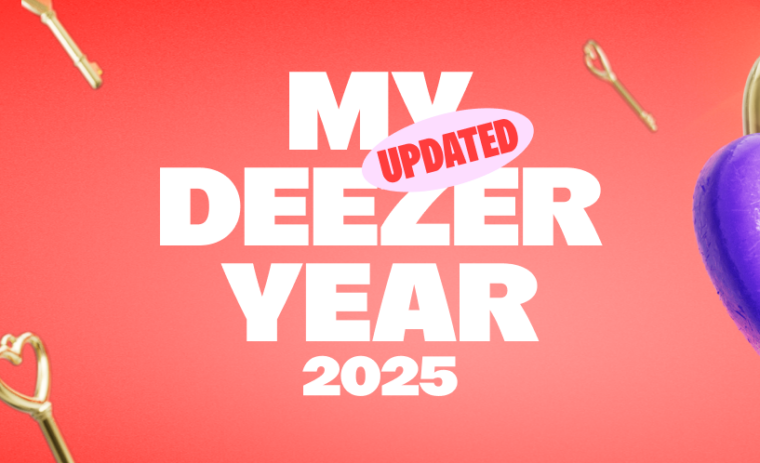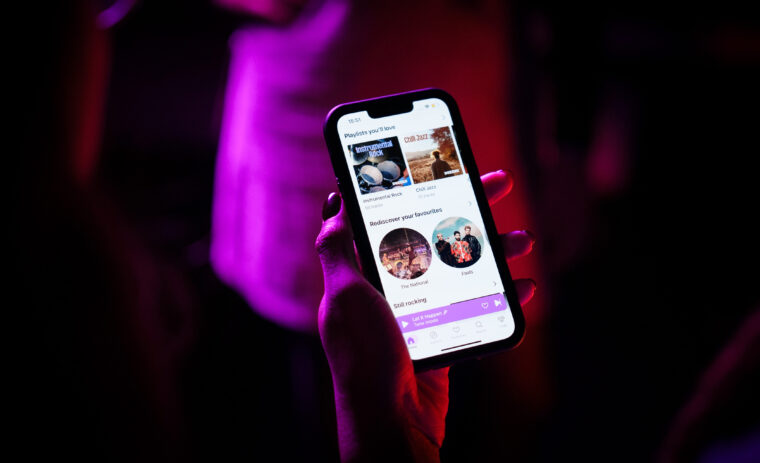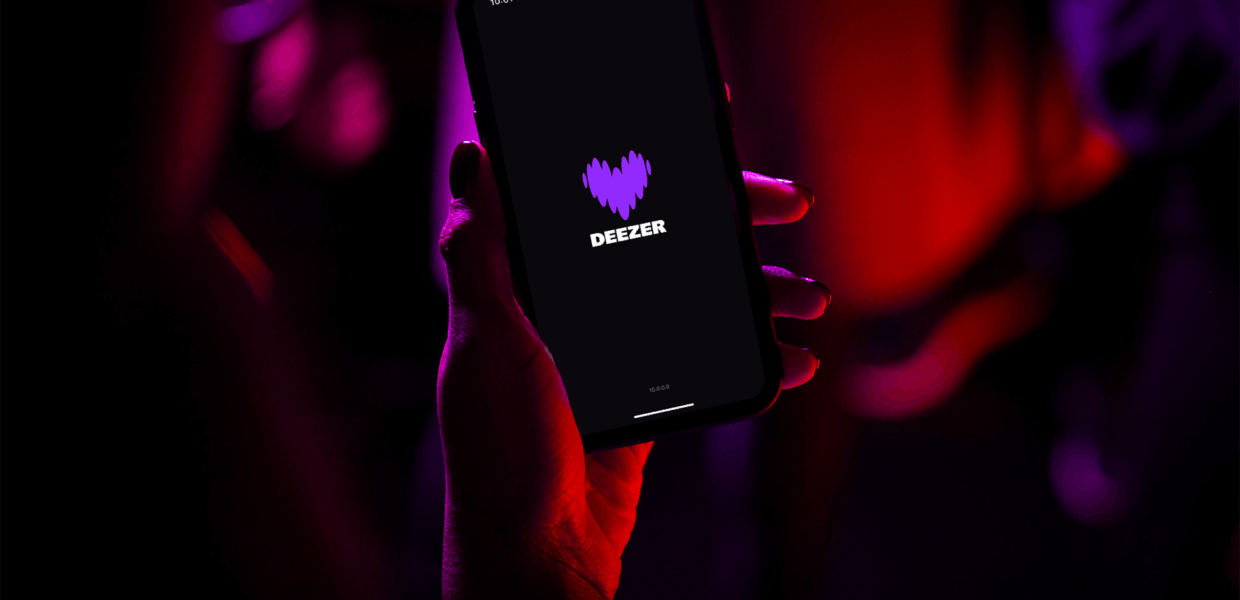

Deezer/Ipsos survey: 97% of people can’t tell the difference between fully AI-generated and human made music – clear desire for transparency and fairness for artists
- Deezer and Ipsos unveil a first-of-its-kind study exploring attitudes and perceptions around AI and music, conducted across 8 countries with 9000 people.
- The survey shows overwhelming support for labeling of 100% AI-generated music, opposition to copyright violations and concerns about the livelihood of artists.
- Deezer also reveals that roughly 50,000 fully AI-generated tracks are now uploaded every day, to the platform, accounting for 34% of all daily deliveries
Can listeners really tell the difference between AI generated and human music?
Paris, November 12, 2025 – Deezer, the global music experience platform, has commissioned the world’s first survey focused on perceptions and attitudes towards AI-generated Music. The survey was carried out by Ipsos with a total of 9000 people in 8 countries – United States, Canada, Brazil, UK, France, Netherlands, Germany and Japan. It revealed a clear desire for tagging 100% AI-generated music and making sure artists and songwriters are being fairly treated and paid if their music is used to train AI-models.
Initially, all participants were asked to listen to three tracks and determine whether or not they were fully AI-generated – 97% of the respondents failed. A majority (71%) of the respondents were surprised by these results and more than half (52%) felt uncomfortable by not being able to tell the difference. All key results from the survey can be found below.
Deezer has taken an industry-unique approach towards AI music, championing the rights of artists, while ensuring transparency for music fans – the company is so far the only streaming platform to detect and clearly tag 100% AI-generated content for its users.
Alexis Lanternier, CEO, Deezer, said: “Deezer has been leading the way in creating solutions for transparency and minimizing the negative impact of fully AI-generated content flooding music streaming. The survey results clearly show that people care about music and want to know if they’re listening to AI or human made tracks or not. There’s also no doubt that there are concerns about how AI-generated music will affect the livelihood of artists, music creation and that AI companies shouldn’t be allowed to train their models on copyrighted material. It’s reassuring to see that we have broad support for our efforts.”
Key results from the survey:
If “music streaming users” (n=6791) is not specifically mentioned, the below data refers to all respondents (General Population n=9000)
General perceptions on AI
- 98% have at least heard of AI and almost 3/4 (72%) used AI at least a few times.
- 55% of the respondents’ place curiosity as one of their first overall sentiment towards AI, and only 19% place trust among their first feelings towards this new tool.
Music creation with AI
- Nearly half (46%) think that AI can help them discover more music they like
- 51% think that AI will play a significant part in music creation in the next 10 years
- 51% think that AI will lead to the creation of more low-quality, generic sounding music on streaming platforms
- Almost two thirds (64%) believe that AI could lead to a loss of creativity in music production
Recognition and consumption of AI-generated music
- 97% couldn’t tell the difference between fully AI-generated music and human-made music in a blind test with two AI songs and one real song
- More than half (52%) felt uncomfortable with not being able to tell the difference between AI and human-made music
- 66% of music streaming users say they would listen to 100% AI-generated music at least once, out of curiosity
- 45% of music streaming users would like to filter out 100% AI-generated music from their music streaming platform
- 40% of music streaming users say that they would skip without listening to 100% AI-music if they came across it
Need for transparency
- 80% agree that 100% AI-generated music should be clearly labeled to listeners
- 73% of music streaming users would like to know if a music streaming service is recommending 100% AI-generated music
- 52% of respondents feel that 100% AI-generated songs should not be included in charts alongside human-made songs in the main charts
- Only 11% believe that 100% AI generated music should be treated equally on charts
- 58% of music streaming users believe that their music streaming platform never recommended 100% AI-generated music to them while 25% are uncertain
Fairness towards artists
- 65% say that it shouldn’t be allowed to use copyrighted material to train AI-models that are used to create music
- 70% believe 100% AI-generated music threatens the livelihood of current and future musicians/artists/composers
- 73% think It’s unethical for AI companies to use copyrighted material to generate new music without clear approval from the original artist
- 69% believe payouts for 100% AI-generated music should be lower than for human-made music
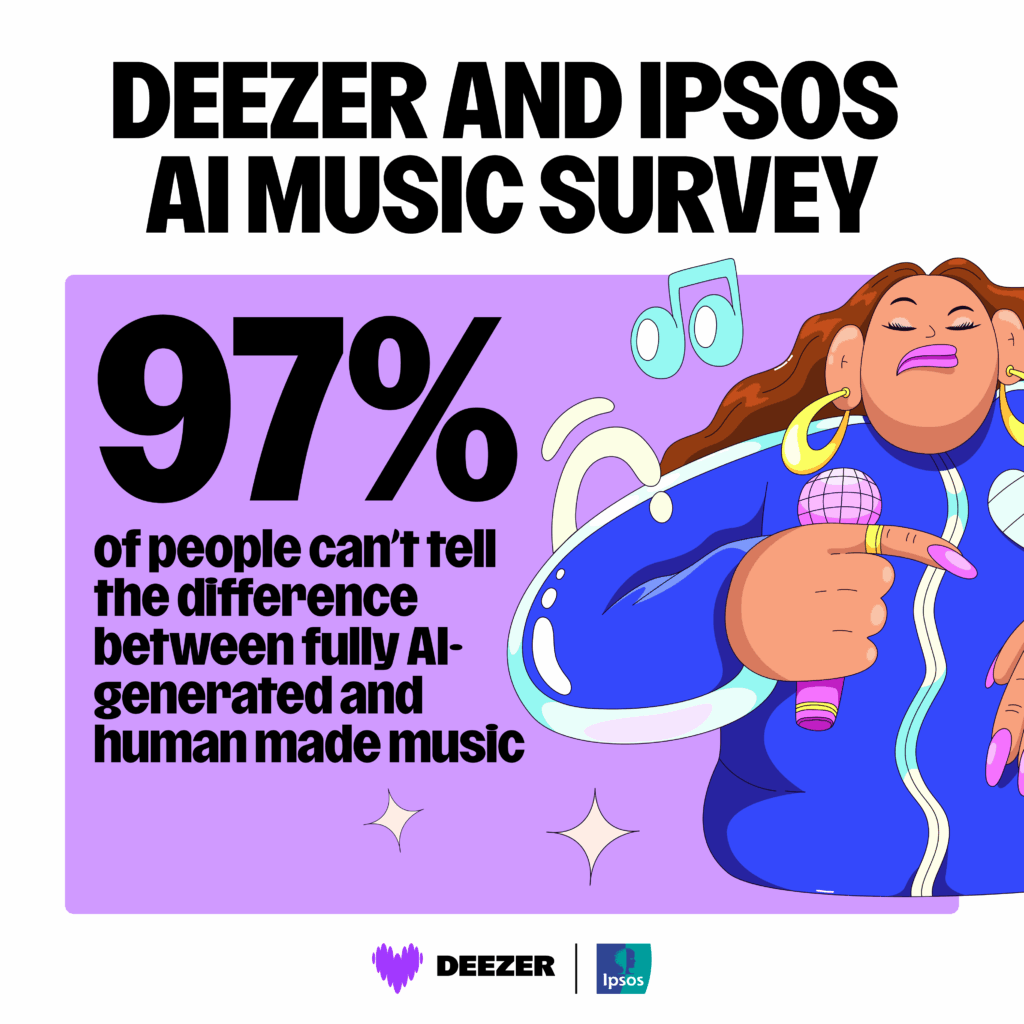
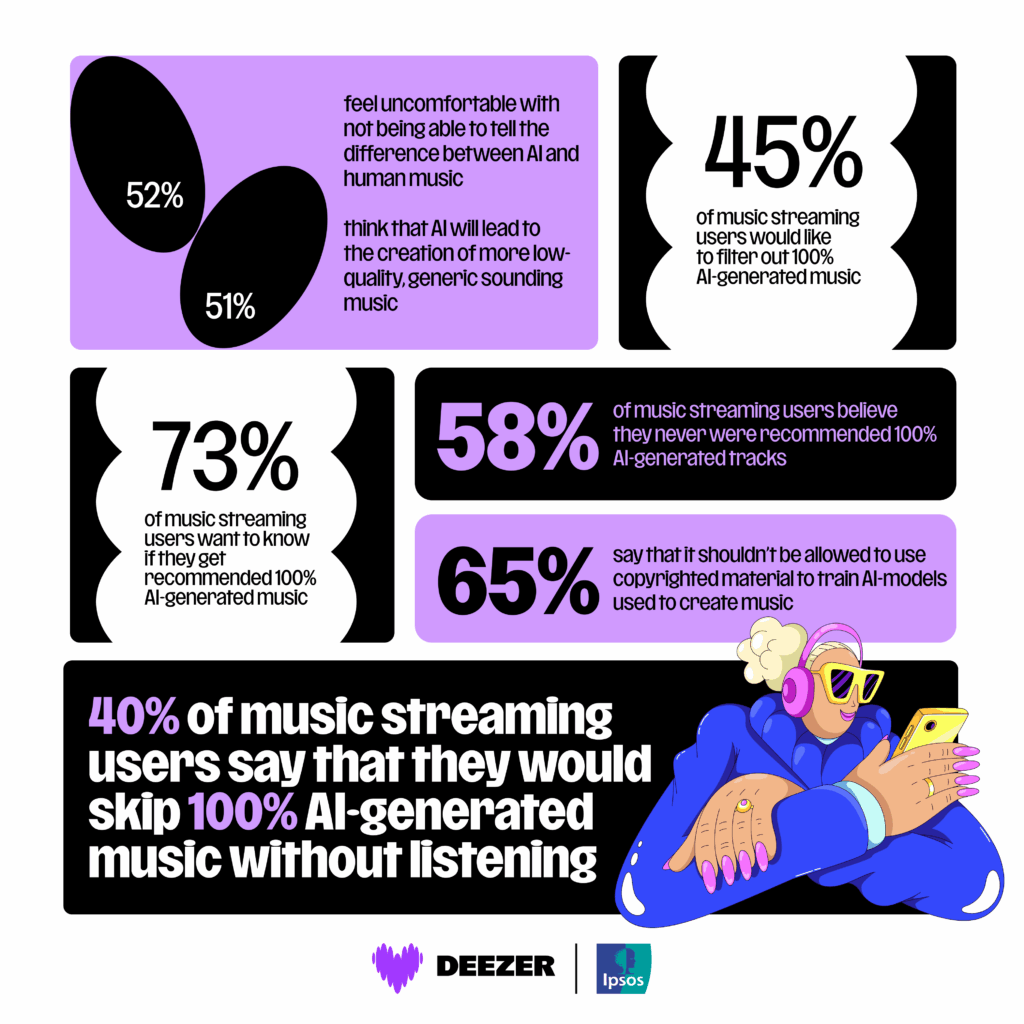
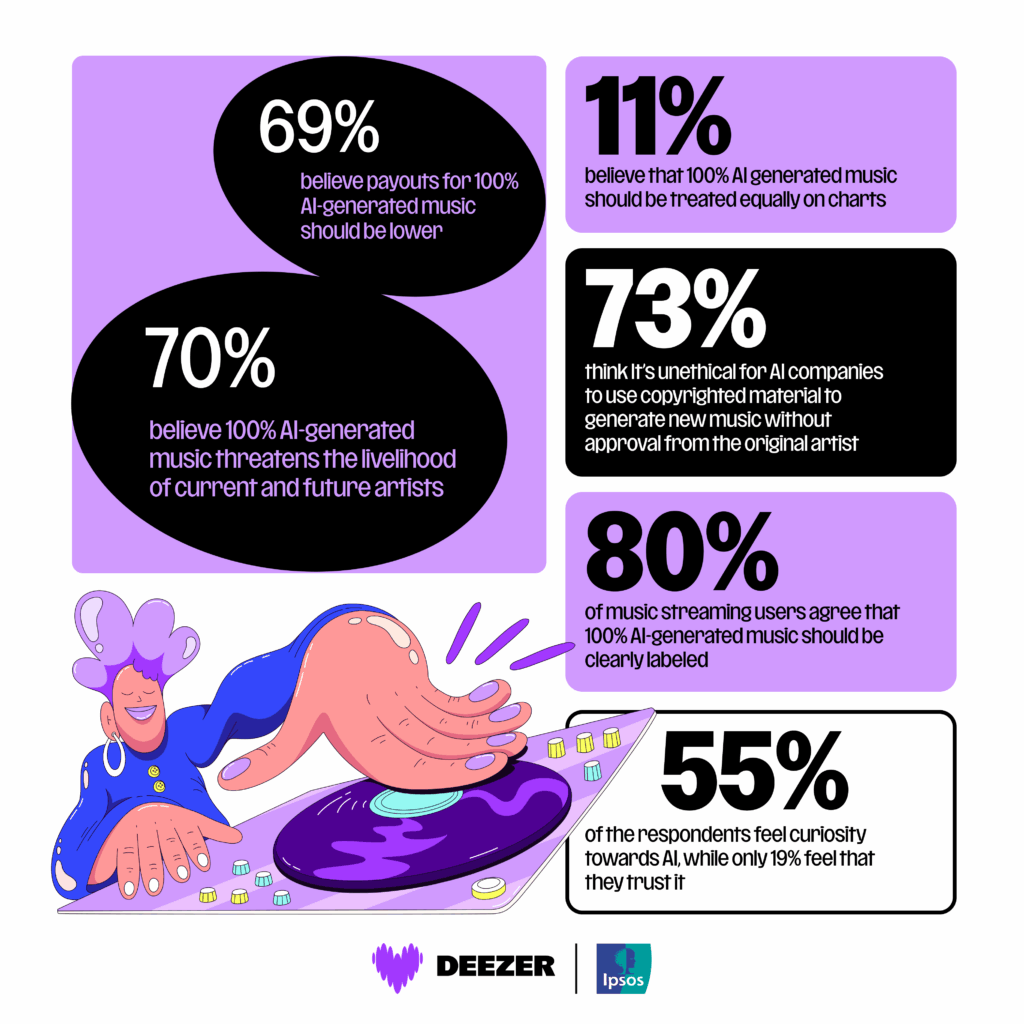
*** ENDS ***
Notes to editors:
Survey methodology
Deezer commissioned an online survey by Ipsos Digital, fielded October 6–10, 2025 across eight markets (n=9,000 adults 18-65). Quotas were applied to ensure nationally proportional representation. If “music streaming users” (n=6791) is not specifically mentioned, the data refers to all respondents.
Deezer, is receiving over 50,000 fully AI-generated tracks every day – accounting for more than 34% of the total daily delivery.
Deezer’s AI detection tool has been in place since the beginning of 2025, enabling the company to track a steady increase of fully synthetic content on the platform. In June, Deezer became the first (and so far only) music streaming platform to explicitly tag AI-generated music.
Deezer’s AI music detection tool sets an industry standard.
With the ability to detect 100 % AI-generated music from the most prolific generative models – such as Suno and Udio, with the possibility to add detection capabilities for practically any other similar tool as long as there’s access to relevant data examples. Not only that, Deezer has made significant progress in creating a system with increased generalizability, to detect AI generated content without a specific dataset to train on.
Deezer is committed to protecting the rights of artists.
The increase in fully AI generated content in music streaming comes at a time of growing concerns about AI companies training their models with copyrighted material, and governments potentially diminishing copyright laws to facilitate AI development. Deezer is committed to protecting the rights of artists and creators, and remains the only streaming platform to sign the global statement on AI training.
AI is a critical challenge for the music industry.
According to a study conducted by CISAC and PMP Strategy, with participation from key industry players (including Deezer), nearly 25% of creators’ revenues are at risk by 2028, which could amount to as much as €4 billion by that time. This represents a colossal, even critical, challenge for the music creation sector as a whole. Read the PMP Strategy/CISAC study on the economic impact of AI in music and audiovisual industries.
AI and fraud.
Although fully AI-generated music currently accounts for only a small fraction of streams on Deezer — approximately 0.5% — it’s evident that the primary purpose of uploading these tracks to streaming platforms is fraudulent. Deezer has found that up to 70% of the streams generated by fully AI-generated tracks are in fact fraudulent. When detecting stream manipulation of any kind, Deezer excludes the streams from the royalty payments.
AI tracks are removed from recommendations.
All 100% AI generated songs are automatically removed from algorithmic recommendations and are not included in editorial playlists. This is a first step in making sure that these tracks don’t dilute the royalty pool in any significant way. Potential future actions, including updating our supplier policy and removing/demonetizing content need to be based on careful consideration.
Two new patents.
In December 2024, Deezer applied for two patents for its AI Detection technology, focused on two different methods of detecting unique signatures that are used to distinguish synthetic content from authentic content.
Press Contact Deezer
Jesper Wendel
jwendel@deezer.com
About Deezer
Deezer is one of the world’s largest independent music experiences platforms, connecting fans with artists and creating ways for people to Live the music. The company provides access to a full-range catalog of high quality music, lossless HiFi audio and industry-defining features on a scalable platform available in 180+ countries. Founded in 2007 in Paris, Deezer is now a global company with over 600 people based in France, Germany, UK, Brazil and the US, all brought together by their passion for music, technology and innovation. By building strategic partnerships in key markets across Europe and the Americas, Deezer keeps delivering brand value and end-user engagement across a wide variety of industries, including telecommunications, media, audio hardware and e-retail. As an industry thought leader, Deezer was the first platform to introduce a new monetization model since the inception of music streaming, designed to better reward the artists, and the music that fans value the most. Deezer is listed on Euronext Paris (Ticker: DEEZR. ISIN: FR001400AYG6) and is also part of the Euronext Tech Leaders segment, dedicated to European high-growth tech companies, and its associated index.
For the latest news, please visit https://newsroom-deezer.com/
For Investor Relations, please visit https://www.deezer-investors.com/
Please follow DeezerNews on X and Deezer on LinkedIn for real time information.

